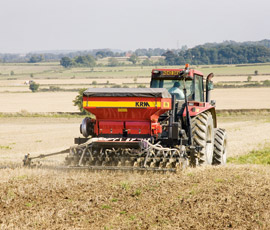Better leadership needed on new technology, says Peter Kendall

Technology, and biotechnology in particular, can help farmers feed the world. But if it is to help deliver the sustainable intensification of agriculture as desired, governments must take more of a leadership role.
The pressure is on as 9bn people need feeding by 2050, requiring 70% more food than today as eating habits evolve.
“How do we face this really pressing global crisis,” asked NFU president Peter Kendall at the CropWorld Global event in London. “As John Beddington has pointed out, we should have focused not on feeding 9bn in 2050 but on 2025, when there will be another half a billion people in Africa alone. Politicians get 2025, 2050 is somebody else’s problem.”
UK farmers adopt new technology very quickly, he noted. But do they have access to the best tools? More research, funded by government, industry and farmers, can help. But better policies are needed too.
“At the moment UK politicians still do not get the challenge of what is needed. And within Europe we still do not have, with the proposals for the reform of the CAP, the right policy framework, one that talks about a competitive, innovative agriculture.
“Instead we have 7% ecological focus areas and a [European] Commission that is determined to defend the budget, rather than help EU agriculture replace imports equivalent to production from an area the size of Germany. If anything we are moving to a Europe that will import more food, not less.
“It is immoral for the developed world in Europe to keep saying it won’t have new biotechnology, this new pesticide, or take big chunks of land out of production, and then depend on the developing world to feed us.”
Farmers and industry can do their bit, but political leaders need to do theirs too, he said. “We need political leadership to explain the benefits and the challenges we face. When we have EU regulators focusing on pesticide hazard, rather than risk, we know we are working with both our hands tied behind our backs.”
“Six or seven years ago there was a view in government that the UK was a rich country and could buy its food from global markets. But three global food price spikes in five years have definitely moved agriculture from the lifestyle pages to the business pages. There are government departments, like the Department for Business, and ministers like David Willetts, who are taking a really, really proactive stance about agriculture and say repeatedly that food security is one of the biggest issues facing society seriously. But that needs to land right in the heart of government.”
“At the moment UK politicians still do not get the challenge of what is needed. And within Europe we still do not have, with the proposals for the reform of the CAP, the right policy framework, one that talks about a competitive, innovative agriculture.”
Peter Kendall
Keith Kemp, a soya bean and maize farmer from Ohio and director of the levy-funded United Soybean Board, representing 500,000 US farmers, had little doubt GM crops were key to sustainable intensification.
On his 700ha farm he has been no-till for 30 years. All his soya is biotech and all his maize. “After the worst drought in living history there is little doubt that without biotech our yields would have been a lot less than expected.”
Biotech crops not only improve production efficiencies, they bring direct benefits for the environment, particularly by aiding the uptake of no-tillage, he noted.
“Herbicide tolerance gives much greater weed control, allowing a switch to min-till and no-till.” With fewer passes fuel savings amount to more than 28,000 litres of diesel a year.
There is less soil damage too. Continuous no-till encourages earth worms and builds organic matter. “In many ways we are actually building our top soils. And that’s the same for farmers the world over.”
Lincolnshire farmer Andrew Ward asked how the EU’s resistance to biotech could be overcome? “I would like to grow GM, but I can’t, yet. What is going to change that?”
Juan Ferreira, Monsanto vice-president for Europe, Middle East and Africa, said policymakers needed to hear from producers. “I am convinced farmers are much more in the driving seat than we, in industry, are.” As food becomes less cheap consumers could become more onside, he noted.
The 2012 mid-west US drought was much tougher than the previous worst in 1988, which cut yield to an average 5.2t/ha average for maize. Early USDA estimates are for a 2012 average of 7.5t/ha. New technologies, particularly biotech, made the difference. “That is sustainable intensification in action.”
If yields remain flat 72-85m ha of extra cropping will be needed by 2050 to feed the world. But only 27-48m ha is available, mainly in South America and Eastern Europe. More yield per hectare is the key. “It is not a choice, it is fundamental.”
But for technology gains to be realised policies need modernising. “Sustainable Intensification needs governments to provide the right policy,” he said.
Policies and pests hamper progress on food security

